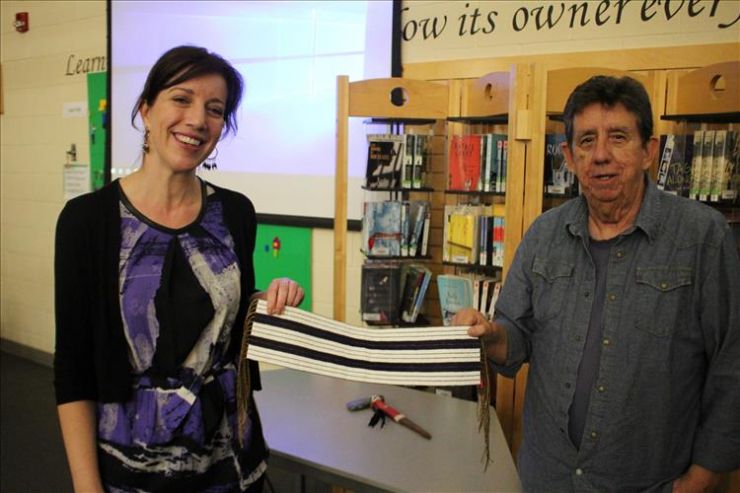Treaties Recognition Week
“The problem with history is it’s his story, not our story,” says Tom Porter, knowledge keeper and Bear Clan elder of the Mohawk nation. He’s speaking to a group of Grand Erie educators and staff ahead of Treaties Recognition Week in Ontario, sharing some of the lessons imparted in his book, And Grandma Said, a collection of Iroquois teachings passed down through oral tradition.

On the same day, at Brantford Collegiate Institute and Vocational School, Teacher Librarian Kate Johnson-McGregor is guiding a discussion with students visiting from James Hillier Public School. On a screen in front of them is a map of Ontario showing significant sites in treaty agreements over the past 300 years.
“What if history had been written from an Indigenous perspective?” she asks. “How might things be different?”
The first week of November is Treaties Recognition Week, a time to provide education on treaty rights, and honour the histories that weren’t always part of the curriculum.
Brantford Collegiate Institute and Vocational School was the site of a ‘Living Library’ event. Guest speakers included elder and historian David Plain and filmmaker Monica Virtue. Using an interactive map, they presented the interwoven history of European settlers to North America and the Indigenous peoples for whom Turtle Island was already home.
“So many people don’t realize how many land agreements and treaties there were, let alone how many have been broken since they were signed,” explains Plain. “Treaties Week is an important opportunity to tell the true history of the land.”
The ‘Living Library’ program brings this to life, providing students with an understanding of the country’s whole history thanks to local Indigenous elders and knowledge keepers who are invited into libraries to act as “talking books,” teaching students about treaties and our obligations in honouring treaty rights. A natural partnership between the Ontario School Libraries Association and the Ministry of Indigenous Relations and Reconciliation, these events support the goals of active, lifelong inquiry, with an open commitment to social justice and equity.

Caption: Monica Virtue and David Plain hold a Two Row wampum
“It’s an honour to host this event and to create this space for everyone, while making visible such important issues” says Johnson-McGregor. “We are all treaty people; this is a history we’re all a part of.”
Knowledge is powerful. As part of its Multi-Year Plan, Grand Erie is committed to Equity, and Treaties Recognition Week is another means to increase the sense of belonging among all students.
Grand Erie classrooms will be highlighting Treaties Recognition Week throughout the month of November. A second Living Library event takes place at Brantford Collegiate Institute and Vocational School on November 14.
Good Food Adds Up to Good Learning at Courtland Pubic School
Evidence suggests that breakfast and snack programs in schools:
- Improves children’s school performance, memory and test grades
- Enhances students’ physical, emotional, social and intellectual development
- Increases attendance rates, particularly for nutritionally at risk children
- Provides additional time for children to eat and drink nutritious breakfasts and snacks
- Provides energy for students to be more physically
- Enhances nutritional status of students by replacing the consumption of foods with low nutritional value with more nutritious choices, such as more vegetables and fruit
- Promotes a sense of community by bringing people together to ensure all children are well-nourished
- Leads to better dietary habits by increasing the frequency of eating breakfast
- Reduces the prevalence of vitamin and mineral deficiencies
With the generous support of the Child Nutrition Network and the Grand Erie District School Board, the school was able to renovate a room in the school into a nutrition program kitchen. Funds provided by the Child Nutrition Network and school fundraising monies purchase the good food and materials needed to run the program.
Every morning at 8 a.m., parent volunteers and their children arrive to prepare and distribute the food for the day. This program would not happen without their enthusiastic support.
Each serving of food includes a dairy product (i.e. yogurt, cheese string), a grain product (i.e. crackers, mixed cereal, muffin, whole wheat bun) and a fruit product (i.e. apple, banana, clementine orange, grapes, juice) or a vegetable product (i.e. cucumber slices, raw carrots). A container filled with food is delivered to each classroom and as children get settled for a day of learning, staff and students are encouraged to help themselves to a delicious and nutritious start to the day.
“Nutrition programs, such as the one at Courtland Public School, are happening in many schools within the Grand Erie District School Board. It’s a huge effort supported by the Board, volunteers and community agencies. Working together, it’s amazing what can be done. We feel most grateful to have this opportunity for our Courtland school community”, says principal Deb Opersko.
Roots of Empathy
Courtland Public School offers the Roots of Empathy program in our Kindergarten A classroom. Our Early Childhood Educator, Mrs. L. Wildman is a trained Roots of Empathy instructor. Our Roots of Empathy baby and her mom are welcome visitors to the classroom.
An explanation of program, from the Roots of Empathy website is included below:
Roots of Empathy is an evidence-based classroom program that has shown significant effect in reducing levels of aggression among schoolchildren by raising social/emotional competence and increasing empathy. The program reaches elementary schoolchildren from Kindergarten to Grade 8. In Canada, the program is delivered in English and French and reaches rural, urban, and remote communities including Aboriginal communities. Roots of Empathy is also delivered in New Zealand, the United States, Isle of Man, the Republic of Ireland, Northern Ireland and Scotland.
Emotional Literacy
At the heart of the program are a neighbourhood infant and parent who visit the classroom every three weeks over the school year. A trained Roots of Empathy Instructor coaches students to observe the baby's development and to label the baby's feelings. In this experiential learning, the baby is the "Teacher" and a lever, which the instructor uses to help children identify and reflect on their own feelings and the feelings of others. This "emotional literacy" taught in the program lays the foundation for more safe and caring classrooms, where children are the "Changers". They are more competent in understanding their own feelings and the feelings of others (empathy) and are therefore less likely to physically, psychologically and emotionally hurt each other through bullying and other cruelties. In the
Roots of Empathy program children learn how to challenge cruelty and injustice. Messages of social inclusion and activities that are consensus building contribute to a culture of caring that changes the tone of the classroom. The Instructor also visits before and after each family visit to prepare and reinforce teachings using a specialized lesson plan for each visit. Research results from national and international evaluations of Roots of Empathy indicate significant reductions in aggression and increases in pro-social behaviour.More News

